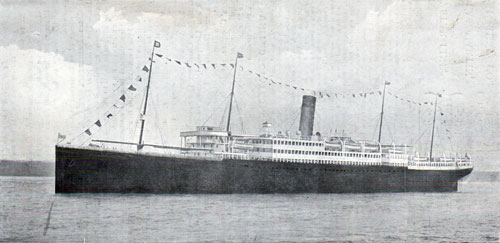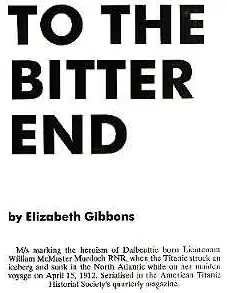7. Reputation and Popularity
This was the world in which Murdoch made his way. The strikers or the strikebreakers who replaced them were the men with whom he somehow had to work, and this was the shipping line to whose instructions he must conform. What his personal opinion might have been is difficult to assess; he may have felt that having taken the company's shilling he was therefore the company's man, or he may have learned to be discreet to the point of impenetrability. There are, however, some hints.

The Arabic.
The first instance involves the best known anecdote regarding Murdoch, from his years on the Arabic, on one of whose voyages he had averted a midnight collision with another ship. Murdoch had just entered the bridge to assume the watch when a sailing vessel appeared immediately ahead; believing the evasion instructions issued to be wrong, he had shoved aside the helmsman and taken the wheel himself to keep the ship on course, rather than create a confusion of orders by countermanding the watch officer. The two ships passed each other, inches away. Murdoch then assumed command and routine returned, until Edwin Jones, an officer from the China coastal trade whom Murdoch had teasingly nicknamed "Chang", rushed back and announced that a passenger on deck for a little night air had seen the near miss. Murdoch had immediately instructed Jones to inform Arabic's captain, Bertram Hayes, that there was a witness: "For God's sake, go and tell Bertie". Jones had already advised the passenger that he had merely seen the Flying Dutchman, a bit of whimsy perfectly reflecting the company axiom that mishaps and rumors of mishaps do not help trade and ought not be communicated to the customer. If Murdoch had not agreed that silence was wise policy, he would still have ordered the captain awakened in the middle of the night out of obedience to orders, but would he have done so in words (and probably tones) suggesting alarm?
The second instance appeared in newspaper coverage of the Titanic. On April 18, 1912, on Page 7, the Scotsman reported the Imperial Merchant Service Guild had released the names of Titanic's four surviving officers, and had further advised that it had no information regarding Chief Officer Wilde and Sixth Officer Moody; the Guild stated that all the named officers were well known to its Executive, which classified them as "enthusiastic supporters". No mention was made by the Guild of Murdoch. It could not have been an oversight; this was official, and the Guild was telegraphing relatives of the surviving officers. The Scotsman reported the "great anxiety" in Dalbeattie over the silence surrounding Murdoch's fate two columns to the right on the same page, so the omission could not have been in Edinburgh, either. The logical assumption is that Murdoch kept clear of union activities.
Whatever his opinion of company policy and the various unions, Murdoch was well liked by the lower deck. The admiration for their First Officer as a person as well as a seaman on the part of Titanic's surviving crew is obvious to anyone reading the American Inquiry transcript. He was often the only officer other than Captain Smith known to the crew, including those who had never before served with him, which suggests that old hands were pointing him out to new ones.
In the context of the age, this popularity is striking and suggests empathy with men to whom an additional $2.50 a month was a goal worth four years of strikes and lockouts. James Cumming, who rose from able seaman to retire a captain, related an incident in 1902 in Liverpool, at which time Cumming said he was still an A.B. Just off duty and still in his work clothes, he encountered a group of White Star's officers in full dress uniform, on their way to the Adelphi Hotel; Murdoch was of the company, and called to Cumming to join them, which he did. Decades (and a social millennium) later, he was still impressed by this invitation, so contrary to Edwardian social distinctions, to join a group of officers in the finest hotel in Liverpool. The memory, however, is not quite accurate. Cumming, who had sailed with Captain Samuel Murdoch on that 1892 maiden voyage of Iquique, not only knew Murdoch well but was a cousin. Furthermore, when Murdoch issued the invitation he was addressing the man who was at the moment Second Mate of the Rae barque Annie Fletcher. There is nothing unusual about asking a brother officer to have a drink, but strikingly clear is the significance of Cumming wrongly attributing the story to his years on the lower deck; the courtesy belonged to the combination of characteristics that defined Murdoch in the minds of the crew.
Sidney H.V. Abbott, a former White Star deck officer who had served with Murdoch on one voyage on the Oceanic, under Captain Haddock, wrote to Walter Lord on June 25, 1955, to advise that any officer who served with Haddock and was then selected for promotion must have been, in Abbott's telling phrase, "outstandingly capable". To White Star's head office, Murdoch was an officer to be entrusted unhesitatingly with their new ships. Beginning in 1903 with the Arabic, he served on a succession of maiden voyages, on ever larger ships: 1907, Adriatic, 1911, Olympic, 1912, Titanic. It is likely that his prompt and correct action in avoiding the sailing ship while on the Arabic had marked him out to headquarters as someone to be remembered; it had been a very near thing, and Murdoch's instantaneous reaction had not only prevented a mid ocean calamity but had gained him the admiring good opinion of everyone who learned of the incident. After the Arabic, a reputation for good judgment and coolness followed him from ship to ship, and along with it the assumption that clings to the successful: an aura of luck.
